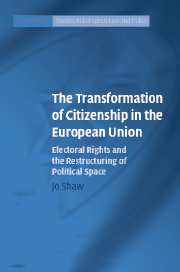 The Transformation of Citizenship in the European Union
The Transformation of Citizenship in the European Union Book contents
- Frontmatter
- Dedication
- Contents
- List of figures
- List of tables
- Preface and acknowledgments
- PART I Electoral rights in legal and political context
- PART II The past, present and future of EU electoral rights
- PART III The contestation of electoral rights in the Member States of the European Union
- PART IV Conclusions
- 11 Conclusions: citizenship and electoral rights in the multi-level ‘euro-polity’
- Bibliography
- Index
11 - Conclusions: citizenship and electoral rights in the multi-level ‘euro-polity’
from PART IV - Conclusions
Published online by Cambridge University Press: 05 June 2015
- Frontmatter
- Dedication
- Contents
- List of figures
- List of tables
- Preface and acknowledgments
- PART I Electoral rights in legal and political context
- PART II The past, present and future of EU electoral rights
- PART III The contestation of electoral rights in the Member States of the European Union
- PART IV Conclusions
- 11 Conclusions: citizenship and electoral rights in the multi-level ‘euro-polity’
- Bibliography
- Index
Summary
During the lengthy period of gestation and preparation of this book, there has been considerable activity at both the national and the EU levels in relation to the use of the criterion of national citizenship as setting the boundaries of the suffrage. Some of the national legislative developments are highlighted briefly below, but in relation to the EU itself, the emphasis has been on the practical application of the Article 19 electoral rights at the national level. Since 1994, there have been no further changes or reforms to the legislative scheme governing the Article 19 electoral rights other than those strictly necessitated by enlargement. However, the body of practice and experience with the operation of these rights has expanded considerably. Three sets of European Parliamentary elections have now taken place under the Article 19 regime, and by 2002 every Member State (then fifteen) had held at least one set of local elections under the equal treatment rules for EU citizens, allowing the Commission to report satisfactory national compliance, at least in principle. As we saw in Chapter 5, however, satisfactory formal compliance does not indicate in itself that the electoral rights for resident EU citizens have become fully part of the political cultures of the Member States.
2004 saw the first phase of eastward enlargement completed, extending the territorial reach of Article 19 from fifteen to twenty-five states, which was then extended to twenty-seven in January 2007 when Bulgaria and Romania joined the Union. Many of these states have also applied the Article 19 rules to local elections since enlargement, although there is no hard evidence as yet of their impact. At the same time enlargement introduced an ambiguous relationship between the legal status of ‘EU citizen’ and the rights of the citizens of the new Member States to take advantage of labour mobility under Article 39 EC.
- Type
- Chapter
- Information
- The Transformation of Citizenship in the European UnionElectoral Rights and the Restructuring of Political Space, pp. 351 - 365Publisher: Cambridge University PressPrint publication year: 2007


